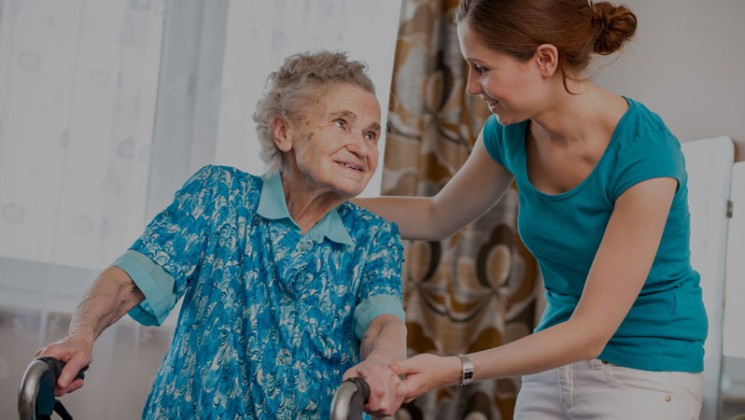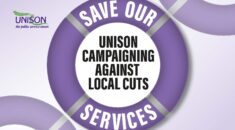A damning new report by UNISON reveals that 74% of councils are still commissioning 15-minute homecare visits – despite universal condemnation of such inadequate care of the elderly and disabled.
These councils are acting against National Institute for Health and Care Excellence (NICE) guidelines on homecare.
And UNISON believes that the lack of time homecare workers are given to provide care symbolises an “escalating crisis” in the homecare system.
“It is heartbreaking and distressing that many elderly and disabled people are not being cared for in a humane and dignified manner,” says UNISON general secretary Dave Prentis.
“Homecare workers have shared their harrowing stories with a strong sense of sadness, guilt, anger, and ultimately disgust at a broken homecare system.”
Suffering Alone At Home, published by the union in January, contains a number of personal experiences of homecare workers, which help to illustrate the human cost of the cuts.
It also includes a new survey of 1,102 homecare workers. Of these:
- 58% have been given just 15 minutes or less to deliver personal care for homecare users;
- 57% have been given just 15 minutes or less to deliver personal care for somebody they have never met before ;
- 61% have not had enough time to provide a dignified level of personal care to a homecare user aged over 90 years;
- 74% believe they do not have enough time to provide dignified care for their homecare users.
“I have 15 minutes to take someone to the toilet, wash their hands, prepare a nutritional meal and try to have a conversation. It makes me feel a failure.”
Councils are alloting such short visit times despite their users having serious conditions such as dementia, Parkinson’s Disease and multiple sclerosis.
“Our heroic homecare workers are battling against a system starved of funding, which is denying them the time they need to deliver dignified care,” says Heather Wakefield, UNISON’s national secretary for local government.
“They are being pushed to the limit. Many of them provide the additional care that people desperately need for no pay, in their own time, resulting in them being paid below the National Minimum Wage.”
Ms Wakefield adds that “the service is run on emotional blackmail and goodwill”, with homecare workers “burdened by the sense of guilt and shame” that comes from being forced to leave or rush their visits, knowing that their homecare users need more time.
UNISON gleaned its information about local authority operations under the Freedom of Information Act. It found no improvement in the attitude to 15-minute homecare visits in the past year, with councils ignoring the recent NICE guidelines – among these, that care workers should spend at least 30 minutes on home visits to older people in England.
NICE also states that homecare visits shorter than half an hour should be made only if “the home care worker is known to the person, the visit is part of a wider package of support, and it allows enough time to complete specific, time-limited tasks or to check if someone is safe and well.”
“I challenge those who make the rules to have their breakfast, and use the toilet and shower within 30 minutes of getting out of their beds. Add to that mobility issues and frailty, and maybe they can appreciate how impossible it is.”
As well as contravening the NICE guidelines, councils are flying in the face of the Care Act, the report suggests.
“The eye-watering cuts imposed by the government mean councils are still booking the shortest possible visits to care for vulnerable, frail and isolated elderly people,” says Prentis.
“Homecare workers are often the only faces some people see all day, and they are a lifeline – only they can call for help and ensure that the housebound people they care for are fed, washed and well.”
Although the government is going to allow local authorities to raise council tax to fund social care, the general secretary believes that “the crisis is so great that any extra cash will barely touch the sides.” It will also be of little help to deprived areas, where the need for homecare visits is greater.
“With the challenge of an ageing population living longer, care planning and adequate funding for social care should be a government priority – and it clearly is not.
“Ministers should stop passing the buck to councils and dig deep to find the cash from treasury coffers to provide dignified care for the elderly. Fifteen-minute homecare visits should have no place in a modern, caring society.”
Through its Save Care Now campaign, UNISON has long been campaigning for a homecare system that treats everyone with dignity – homecare worker and user alike.
As well as calling on the government to invest in social care, the union is urging all council’s to sign its Ethical Care Charter, which comprises a set of commitments that ensures the health, safety, and dignity of the UK’s most vulnerable people.
UNISON is also calling for councils to survey their homecare workforces regularly and ensure that 15-minute visits are no longer used to deliver personal care.
Homecare workers speak out
“It makes me feel angry, ashamed and embarrassed…. Service users feel let down by workers constantly changing, coming at different times every day and being in a rush to do the job and move on because of their time constraints.”
“I hate not having enough time with dementia clients, because they tend to be very lonely.”
“Not being able to spend longer with clients who are terminally ill makes me feel as if I’m shortchanging them – and makes it seem as if I don’t care about them.”
“A lot of the elderly are lonely, and if we have to leave early you are taking away one of their few opportunities for some company.”
“It’s disrespectful. These people have lived through wars to become reliant on help. It feels like you’re abusing them or their rights.”
“In the past I have been the only person to see a service user on Christmas day and their birthday. It makes you feel very sad and you just try to do your best to make it a bit more special.”
“12 years experience didn’t prepare me for the feeling of failing a person.”
“Guilt, that is what you feel. I am not in this type of work just for a wage. I want to make a difference to people, more so to those who have no-one. I want to let them know there are people who care.”







